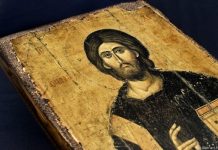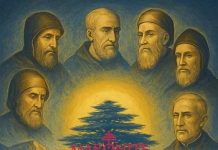Who is Nimrod in the Bible?
Gen 10:6-14
That which is observable and improvable in these verses is the account here given of Nimrod, Gen_10:8-10. He is here represented as a great man in his day: He began to be a mighty one in the earth, that is, whereas those that went before him were content to stand upon the same level with their neighbours, and though every man bore rule in his own house yet no man pretended any further, Nimrod’s aspiring mind could not rest here; he was resolved to tower above his neighbours, not only to be eminent among them, but to lord it over them. The same spirit that actuated the giants before the flood (who became mighty men, and men of renown, Gen_6:4), now revived in him, so soon was that tremendous judgment which the pride and tyranny of those mighty men brought upon the world forgotten. Note, There are some in whom ambition and affectation of dominion seem to be bred in the bone; such there have been and will be, notwithstanding the wrath of God often revealed from heaven against them. Nothing on this side hell will humble and break the proud spirits of some men, in this like Lucifer, Isa_14:14, Isa_14:15. Now,
I. Nimrod was a great hunter; with this he began, and for this became famous to a proverb. Every great hunter is, in remembrance of him, called a Nimrod. 1. Some think he did good with his hunting, served his country by ridding it of the wild beasts which infested it, and so insinuated himself into the affections of his neighbours, and got to be their prince. Those that exercise authority either are, or at least would be called, benefactors, Luk_22:25. 2. Others think that under pretence of hunting he gathered men under his command, in pursuit of another game he had to play, which was to make himself master of the country and to bring them into subjection. He was a mighty hunter, that is, he was a violent invader of his neighbours’ rights and properties, and a persecutor of innocent men, carrying all before him, and endeavouring to make all his own by force and violence. He thought himself a mighty prince, but before the Lord (that is, in God’s account) he was but a mighty hunter. Note, Great conquerors are but great hunters. Alexander and Caesar would not make such a figure in scripture-history as they do in common history; the former is represented in prophecy but as a he-goat pushing, Dan_8:5. Nimrod was a mighty hunter against the Lord, so the Septuagint; that is, (1.) He set up idolatry, as Jeroboam did, for the confirming of his usurped dominion. That he might set up a new government, he set up a new religion upon the ruin of the primitive constitution of both. Babel was the mother of harlots. Or, (2.) He carried on his oppression and violence in defiance of God himself, daring Heaven with his impieties, as if he and his huntsmen could out-brave the Almighty, and were a match for the Lord of hosts and all his armies. As if it were a small thing to weary men, he thinks to weary my God also, Isa_7:13.
II. Nimrod was a great ruler: The beginning of his kingdom was Babel, Gen_10:10. Some way or other, by arts or arms, he got into power, either being chosen to it or forcing his way to it; and so laid the foundations of a monarchy, which was afterwards a head of gold, and the terror of the mighty, and bade fair to be universal. It does not appear that he had any right to rule by birth; but either his fitness for government recommended him, as some think, to an election, or by power and policy he advanced gradually, and perhaps insensibly, into the throne. See the antiquity of civil government, and particularly that form of it which lodges the sovereignty in a single person. If Nimrod and his neighbours began, other nations soon learned to incorporate under one head for their common safety and welfare, which, however it began, proved so great a blessing to the world that things were reckoned to go ill indeed when there was no king in Israel.
III. Nimrod was a great builder. Probably he was architect in the building of Babel, and there he began his kingdom; but, when his project to rule all the sons of Noah was baffled by the confusion of tongues, out of that land he went forth into Assyria (so the margin reads it, Gen_10:11) and built Nineveh, etc., that, having built these cities, he might command them and rule over them. Observe, in Nimrod, the nature of ambition. 1. It is boundless. Much would have more, and still cries, Give, give. 2. It is restless. Nimrod, when he had four cities under his command, could not be content till he had four more. 3. It is expensive. Nimrod will rather be at the charge of rearing cities than not have the honour of ruling them. The spirit of building is the common effect of a spirit of pride. 4. It is daring, and will stick at nothing. Nimrod’s name signifies rebellion, which (if indeed he did abuse his power to the oppression of his neighbours) teaches us that tyrants to men are rebels to God, and their rebellion is as the sin of witchcraft.
Source(s): Matthew Henry’s Commentary on the Whole Bible
Genesis 10:8-12; Genesis 3:15; Genesis 11
After the flood Noah and his family repopulated the earth. Because the deluge did not eradicate sin, man’s sinful nature ran wild once again. At the same time, territories were overrun with wild beasts, turning against the inhabitants of the land. The battle of man against beast was hot and fearful, but in the midst of it, Nimrod, son of Cush, appeared as the ‘knight in shining armor’. A “mighty hunter,” Nimrod delivered the people from the fear of beasts. Hungry for power, though, he also emancipated man from the LORD.
Until Nimrod, mankind was governed by the patriarchal system where the heads of families heard from God and guided their individual tribes. Nimrod, more accurately a “mighty hunter against the LORD,” usurped patriarchal rule, and crowned himself the first human king in all of history. Now man ruled instead of God.
According to the Bible, he was the son of Cush (1 Ch. 1:10). His name was derived from the Hebrew verb mahadh meaning “rebel”. The Babylonian Talmud states: “Why, then, was he called Nimrod? Because he stirred up the whole world to rebel against His [God’s] sovereignty.” He was the founder and King of the first empire to come into existence after the flood of Noah’s day and he distinguished himself as a mighty hunter in opposition to God.
Babylon In The Bible
Babylon is still located in Iraq.Babylon (Syriac: ܒܵܐܒܸܠ or ܒܐܒܠ) (Arabic: بابل) was a city-state of ancient Mesopotamia, the remains of which are found in present-day Al Hillah, Babil Province, Iraq, about 85 kilometers (55 mi) south of Baghdad. All that remains of the original ancient famed city of Babylon today is a mound, or tell, of broken mud-brick buildings and debris in the fertile Mesopotamian plain between the Tigris and Euphrates rivers, in Iraq. Although it has been reconstructed, historical resources inform us that Babylon was at first a small town, that had sprung up by the beginning of the third millennium BC (the dawn of the dynasties). The town flourished and attained prominence and political repute with the rise of the First Babylonian Dynasty. It was the “holy city” of Babylonia by approximately 2300 BC, and the seat of the Neo-Babylonian Empire from 612 BC. The Hanging Gardens of Babylon were one of the Seven Wonders of the Ancient World.
The form Babylon is the Greek variant of Akkadian Babilu (bāb-ilû, meaning “Gateway of the god(s)”, translating Sumerian Ka.dingir.ra). In the Hebrew Bible, the name appears as בבל (Babel), interpreted by Book of Genesis 11:9 to mean “confusion” (of languages), from the verb balbal, “to confuse”.
The Tower of Babel (Hebrew: מגדל בבל Migdal Bavel Arabic: برج بابل Burj Babil), according to the Book of Genesis,[1] was an enormous tower built at the city of Babylon (Hebrew: Babel, Akkadian: Babilu), a cosmopolitan city typified by a confusion of languages,[2] also called the “beginning” of Nimrod’s kingdom. According to the biblical account, a united humanity of the generations following the Great Flood, speaking a single language and migrating from the east, participated in the building. The people decided their city should have a tower so immense that it would have “its top in the heavens.”[3]
However, the Tower of Babel was not built for the worship and praise of God, but was instead dedicated to the glory of man, to “make a name” for the builders: “Then they said, ‘Come, let us build ourselves a city, and a tower with its top in the heavens, and let us make a name for ourselves; otherwise we shall be scattered abroad upon the face of the whole earth.'” (Genesis 11:4). The Book of Genesis then relates how God, displeased with the builders’ intent, came down and confused their languages and scattered the people throughout the earth.
The Tower of Babel has often been associated with known structures, notably the Etemenanki, a ziggurat dedicated to Marduk by Nabopolassar (c. 610 BC). The Great Ziggurat of Babylon base was square (not round), 91m in height, but was finally demolished by Alexander the Great before his death in an attempt to rebuild it. A Sumerian story with some similar elements is preserved in Enmerkar and the Lord of Aratta.
The story is found in genesis 11:1-9˄ (King James Version) as follows:
1 And the whole earth was of one language, and of one speech. 2 And it came to pass, as they journeyed from the east, that they found a plain in the land of Shinar; and they dwelt there. 3 And they said one to another, Go to, let us make brick, and burn them thoroughly. And they had brick for stone, and slime had they for mortar. 4 And they said, Go to, let us build us a city and a tower, whose top may reach unto heaven; and let us make us a name, lest we be scattered abroad upon the face of the whole earth. 5 And the Lord came down to see the city and the tower, which the children built. 6 And the Lord said, Behold, the people is one, and they have all one language; and this they begin to do; and now nothing will be restrained from them, which they have imagined to do. 7 Go to, let us go down, and there confound their language, that they may not understand one another’s speech. 8 So the Lord scattered them abroad from thence upon the face of all the earth: and they left off to build the city. 9 Therefore is the name of it called Babel; because the Lord did there confound the language of all the earth: and from thence did the Lord scatter them abroad upon the face of all the earth.
The phrase “the Tower of Babel” does not actually appear in the Bible; it is always, “the city and its tower” (אֶת-הָעִיר וְאֶת-הַמִּגְדָּל) or just “the city” (הָעִיר).
The story explains the origin of nations, of their languages, and of Babylon (Babel). The story’s theme of competition between the Lord and humans appears elsewhere in Genesis, in the story of Adam and Eve in the Garden of Eden. The story displays the Lord’s contempt for human pride.
The traditional Judaeo-Christian interpretation, as found for example in the writings of Flavius Josephus, explains the construction of the tower as a hubristic act of defiance against God ordered by the arrogant tyrant Nimrod.
Source(s): Bible, Dictionary



















